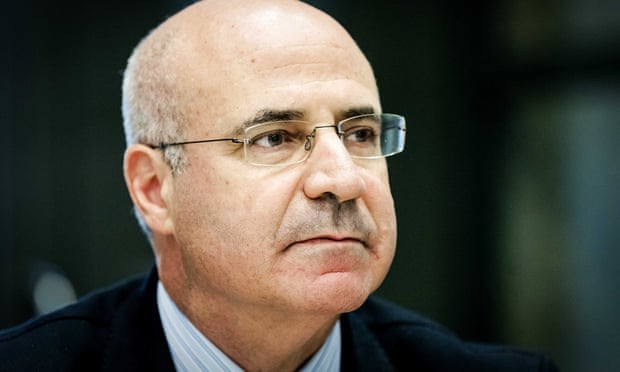Bill Browder, a prominent critic of Vladimir Putin, has been released following his arrest in Spain on Wednesday morning under a Russian warrant.
The anti-corruption campaigner wrote on Twitter that he was freed from custody in Madrid after the Interpol general secretary in Lyon had advised them not to honour the Russian arrest warrant. He said it was the sixth time Russia had “abused” Interpol in his case.
As head of the Hermitage Capital Management investment fund, Browder led a campaign to expose corruption and punish Russian officials he blames for the 2009 death of Sergei Magnitsky, whom he employed as a lawyer.
He had earlier on Wednesday tweeted his arrest and posted a photo from the back of the police car.
He subsequently tweeted a picture of the arrest warrant, which said he was detained on suspicion of fraud.
Magnitsky was imprisoned on charges widely considered to be false, and died amid claims he was tortured.
His death prompted Browder, once the largest foreign portfolio investor in Russia, to work with the US Congress to pass the Magnitsky Act, which levied targeted sanctions against powerful players in Russia and has infuriated Putin.
The Magnitsky Act returned to the headlines in 2017 after it emerged that a lawyer supporting the Russian government’s position had met senior figures in Donald Trump’s US presidential campaign, including Trump’s son and son-in-law.
Russia placed Browder on the Interpol wanted list last year, apparently exploiting a loophole that lets countries unilaterally place individuals on the database used to request an arrest.
Browder said at the time that he had been alerted to the move by an email from the US Department of Homeland Security saying his “global entry status” had been revoked. Further calls confirmed he had been added to Interpol’s list via an arrest demand, known as a “diffusion”.
In what many western governments consider to be a vendetta against Browder, Moscow tried three times between 2012 and 2015 to get Interpol to issue arrest orders against him, but failed to convince the organisation that its motives were not political.
In 2016, the Council of Europe criticised Russia’s attempts to seek Browder’s arrest through Interpol, calling the efforts “abuses” of the system.
Russian state investigators last year separately named Browder as the suspect responsible for the mysterious deaths of three men linked to a massive £174m tax-fraud scheme discovered by Magnitsky and believed to have involved Russian officials.
Browder said the reason he was in Madrid was to give evidence to the senior Spanish anti-Russian mafia prosecutor Jose Grinda about what he described as the “huge amount of money from the Magnitsky case that flowed to Spain”.
Original Article
Source: theguardian.com
Author: Jon Henley
The anti-corruption campaigner wrote on Twitter that he was freed from custody in Madrid after the Interpol general secretary in Lyon had advised them not to honour the Russian arrest warrant. He said it was the sixth time Russia had “abused” Interpol in his case.
As head of the Hermitage Capital Management investment fund, Browder led a campaign to expose corruption and punish Russian officials he blames for the 2009 death of Sergei Magnitsky, whom he employed as a lawyer.
He had earlier on Wednesday tweeted his arrest and posted a photo from the back of the police car.
He subsequently tweeted a picture of the arrest warrant, which said he was detained on suspicion of fraud.
Magnitsky was imprisoned on charges widely considered to be false, and died amid claims he was tortured.
His death prompted Browder, once the largest foreign portfolio investor in Russia, to work with the US Congress to pass the Magnitsky Act, which levied targeted sanctions against powerful players in Russia and has infuriated Putin.
The Magnitsky Act returned to the headlines in 2017 after it emerged that a lawyer supporting the Russian government’s position had met senior figures in Donald Trump’s US presidential campaign, including Trump’s son and son-in-law.
Russia placed Browder on the Interpol wanted list last year, apparently exploiting a loophole that lets countries unilaterally place individuals on the database used to request an arrest.
Browder said at the time that he had been alerted to the move by an email from the US Department of Homeland Security saying his “global entry status” had been revoked. Further calls confirmed he had been added to Interpol’s list via an arrest demand, known as a “diffusion”.
In what many western governments consider to be a vendetta against Browder, Moscow tried three times between 2012 and 2015 to get Interpol to issue arrest orders against him, but failed to convince the organisation that its motives were not political.
In 2016, the Council of Europe criticised Russia’s attempts to seek Browder’s arrest through Interpol, calling the efforts “abuses” of the system.
Russian state investigators last year separately named Browder as the suspect responsible for the mysterious deaths of three men linked to a massive £174m tax-fraud scheme discovered by Magnitsky and believed to have involved Russian officials.
Browder said the reason he was in Madrid was to give evidence to the senior Spanish anti-Russian mafia prosecutor Jose Grinda about what he described as the “huge amount of money from the Magnitsky case that flowed to Spain”.
Original Article
Source: theguardian.com
Author: Jon Henley

No comments:
Post a Comment